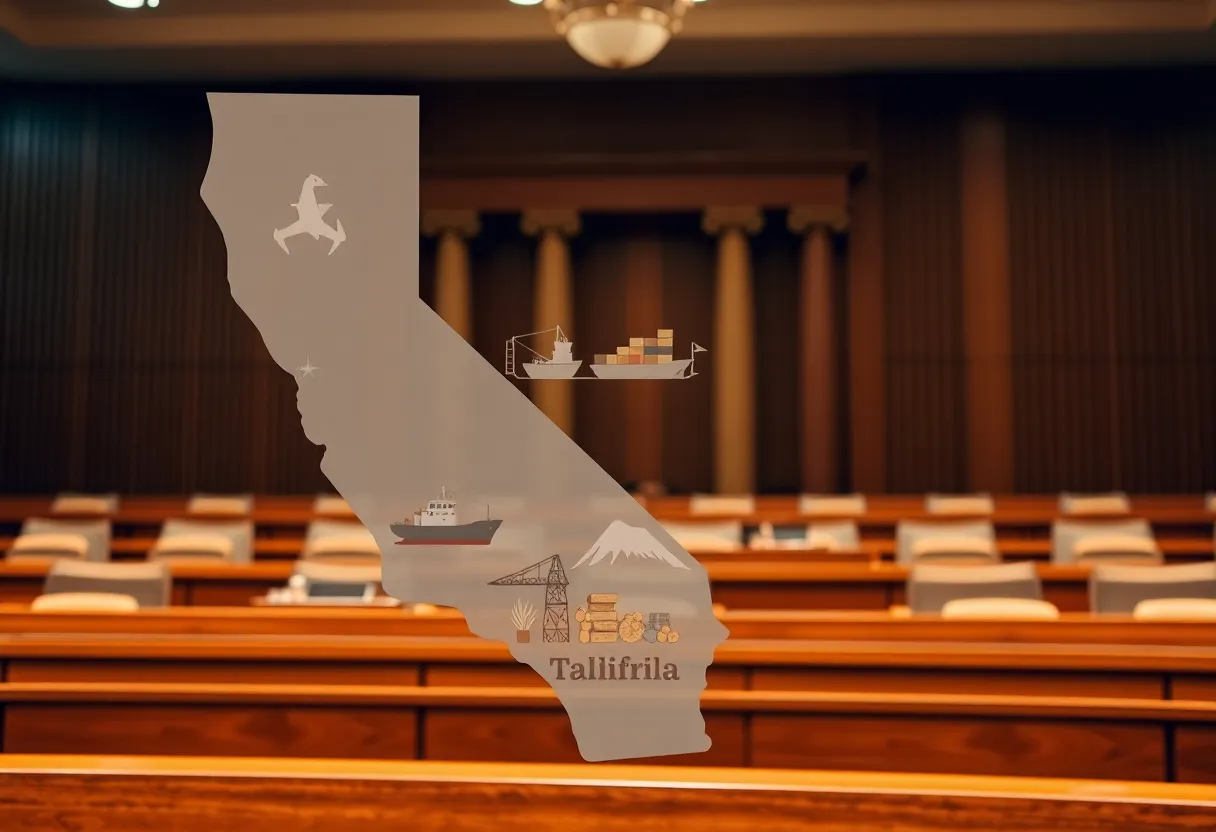News Summary
California, led by Governor Gavin Newsom and Attorney General Rob Bonta, is suing the federal government over President Trump’s tariffs, claiming they are unlawful. Filed in the U.S. District Court for the Northern District of California, the lawsuit argues that only Congress has the authority to impose tariffs, not the president. California’s economy, heavily reliant on international trade, faces significant financial risks from these tariffs, which could lead to substantial losses for local businesses and the agricultural sector. The outcome of this case could redefine the future of tariff enforcement in America.
California Takes a Stand Against Unlawful Tariffs
California is stepping into the legal arena, taking action against the Trump administration’s tariff policies. Governor Gavin Newsom, along with Attorney General Rob Bonta, is suing the federal government in a bid to challenge the authority of the president in imposing tariffs. This lawsuit has been filed in the U.S. District Court for the Northern District of California.
What’s the Big Deal?
So, what’s the fuss all about? Simply put, California argues that by using the International Emergency Economic Powers Act (IEEPA) to impose tariffs, President Trump is overstepping his boundaries. The Golden State insists that only Congress holds the power to enforce such tariffs—not the president. This significant lawsuit is the first major challenge from a state regarding Trump’s tariff policies, making it a historic event in the ongoing tussle between state and federal powers.
The Stakes Are High
California officials are sounding the alarm bells, stating that no other state stands to lose more from these tariffs than California itself. The state economy, which is the world’s fifth-largest, is reportedly facing “immediate and irreparable harm” due to these tariffs. They are urging the court to declare Trump’s orders as “unlawful and void” and to put a stop to any enforcement actions by the Department of Homeland Security and Customs and Border Protection.
Billions on the Line
According to their complaint, California contends that the tariffs could lead to losses amounting to billions of dollars, threatening the well-being of local businesses and potentially pushing the state toward a budget deficit. The implications are monumental, with the lawsuit indicating that the tariffs could hinder California’s ability to achieve various policy goals, particularly in managing finances effectively.
Trade Matters
California’s economy is tightly interwoven with international trade. The state relies heavily on its trading relationships with countries like Mexico, Canada, and China—last year, these three nations accounted for over 40% of California’s imports, which reached an impressive $203 billion. Furthermore, the agricultural sector stands to suffer the most, exporting approximately $24 billion worth of goods annually to various markets.
Warnings from the Trenches
The harmful effects of tariffs don’t stop at trade figures; they might also spike rebuilding costs after natural disasters, thanks to higher prices for necessary materials. As tension rises, the lawsuit comes as part of a larger movement against Trump’s unpredictable tariff strategies, which have sparked trade wars and created economic uncertainties across the country.
Looking Beyond the Lawsuit
Newsom has expressed concerns about the need for California to forge international trade agreements to lessen the blow from retaliatory tariffs on exporters. As attitudes shift, the Trump administration holds firm on its position that tariffs are essential for ensuring fair trade and fostering an industrious America.
White House Response
In response to the legal battle, the White House has suggested that instead of pursuing this lawsuit, California officials should focus on more immediate local issues, such as crime and homelessness. This clash of priorities showcases the ongoing debate on how best to address states’ rights versus federal authority.
A Turning Point for Tariffs?
The outcome of this legal challenge could reshape how tariffs are created and enforced in the future. Historically, tariffs haven’t been imposed using the IEEPA, and now the future of many California businesses hangs in the balance. As concerns grow over inflation and potential job losses, it’s clear that the ripple effects of these tariffs are beginning to transform market dynamics across the state.
This lawsuit exemplifies how a state like California is standing up for its economic interests, setting the stage for a potentially transformative debate on how American trade policies are crafted. With so much at stake, all eyes are on this significant case as it unfolds in court.
Deeper Dive: News & Info About This Topic
- BBC News
- Wikipedia: Tariff
- Reuters
- Google Search: California tariff lawsuit 2025
- Washington Post
- Google Scholar: California tariffs
- AP News
- Encyclopedia Britannica: Tariff
- NBC News
- Google News: California tariffs

Author: STAFF HERE FLORENCE WRITER
The FLORENCE STAFF WRITER represents the experienced team at HEREFlorence.com, your go-to source for actionable local news and information in Florence, Florence County, and beyond. Specializing in "news you can use," we cover essential topics like product reviews for personal and business needs, local business directories, politics, real estate trends, neighborhood insights, and state news affecting the area—with deep expertise drawn from years of dedicated reporting and strong community input, including local press releases and business updates. We deliver top reporting on high-value events such as the Florence Festival of Lights, Pee Dee Pride, and agricultural expos at the Florence Center. Our coverage extends to key organizations like the Florence Regional Chamber of Commerce and the Pee Dee Area Council of Governments, plus leading businesses in healthcare and retail that power the local economy such as McLeod Health and Pee Dee Electric Cooperative. As part of the broader HERE network, including HERECharleston.com, HEREColumbia.com, HEREGreenville.com, and HEREHiltonHead.com, we provide comprehensive, credible insights into South Carolina's dynamic landscape.





